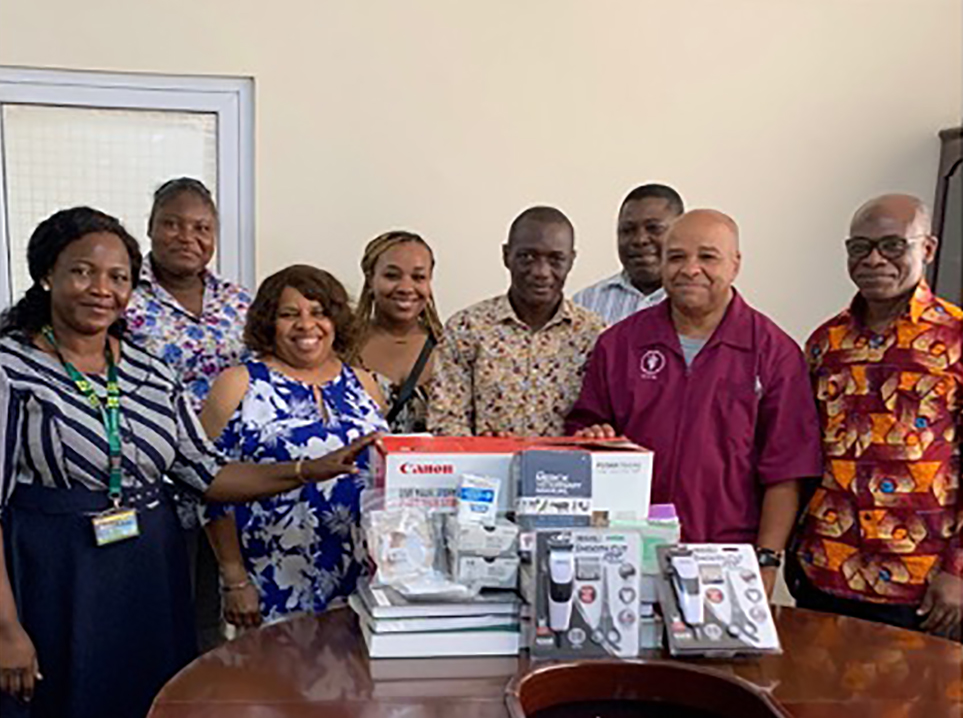 Veronica McKenzie picked up the donated supplies from UAB to bring to Ghana in May.A donation of much-needed veterinary medical supplies, provided by the University of Alabama at Birmingham, has been shared with a Ghanaian university as part of a UAB graduate’s Fulbright U.S. Scholar service project.
Veronica McKenzie picked up the donated supplies from UAB to bring to Ghana in May.A donation of much-needed veterinary medical supplies, provided by the University of Alabama at Birmingham, has been shared with a Ghanaian university as part of a UAB graduate’s Fulbright U.S. Scholar service project.
David McKenzie, DVM, Ph.D., is on the faculty of Tuskegee University’s College of Veterinary Medicine, where he is a professor in the Department of Large Animal Clinical Sciences and an adjunct professor of health education in the Department of Graduate Public Health. He earned a master’s degree in epidemiology and international health in 2004 and a Ph.D. in health education in 2012, now offered as the Ph.D. in health behavior, both from the UAB School of Public Health.
In 2010, McKenzie was invited to accompany a team to visit Kwame Nkrumah University of Science and Technology School of Veterinary Medicine in Kumasi, Ghana, to evaluate their veterinary infrastructure and look for ways to collaborate. KNUST visited the United States in 2011. From that series of visits, KNUST and Tuskegee have collaborated ever since, exchanging faculty and staff and hosting graduate students.
Nearly 10 years later, McKenzie applied to the Fulbright U.S. Scholar Program to teach with KNUST in mind. In November 2021, he was able to visit their campus as a Fulbright U.S. Scholar. His specialty is large animal internal medicine, including horses, cows, sheep, goats and pigs, encompassing all aspects of their medical well-being. He taught different diagnostic and treatment techniques to students and some junior faculty.
While he was working in Ghana, his wife, Veronica McKenzie, reached out to UAB President Ray Watts’ office asking if UAB could donate suture materials. KNUST needed current or expired suture materials for their animal surgeries. COVID, plus the war in Ukraine, has affected the university’s supply lines. They usually receive their supplies through European companies, and with the unfortunate events of the last few years, especially early this year, those supplies have been drastically reduced. The veterinary college was looking for alternative sources of supplies, McKenzie says.
 Left to Right: Dr. Esther Amemor, Head of Dept. of Clinical Studies; Dr. Rejoice Nyarku, lecturer; Veronica McKenzie; Catherine McKenzie; Joseph Atawalna, vice dean KNUST-SVM; Vitus Burimuah, head of the KNUST Dept. of Pathobiology; David McKenzie, Fulbright U. S. Scholar; Raphael Folitse, foundational dean of the KNUST-SVM.Watts’ office connected with the UAB Office of Research, which was able to facilitate the donation. Watts gave special kudos to “our wonderful folks” in the Animal Resources Program, for collecting and packaging the supplies and facilitating the donation.
Left to Right: Dr. Esther Amemor, Head of Dept. of Clinical Studies; Dr. Rejoice Nyarku, lecturer; Veronica McKenzie; Catherine McKenzie; Joseph Atawalna, vice dean KNUST-SVM; Vitus Burimuah, head of the KNUST Dept. of Pathobiology; David McKenzie, Fulbright U. S. Scholar; Raphael Folitse, foundational dean of the KNUST-SVM.Watts’ office connected with the UAB Office of Research, which was able to facilitate the donation. Watts gave special kudos to “our wonderful folks” in the Animal Resources Program, for collecting and packaging the supplies and facilitating the donation.
“Mrs. McKenzie was thrilled with how much we were able to share and said they would be extremely helpful for Dr. McKenzie and his colleagues in Kumasi,” Watts said. She and their daughter Catherine brought the supplies to Ghana in May.
UAB provided suture material and basic surgical equipment for treatment and teaching, which was put to immediate use.
“These supplies were a great help,” McKenzie said. “We got supplies from other sources, including Tuskegee University. We had textbooks and other vet supplies from UAB, which were very much needed. We are so happy to have made this partnership with UAB, and I am hopeful we will be able to continue in some fashion.”
Kwame Nkrumah University of Science and Technology is one of the leading universities in West Africa, teaching subjects from human and veterinary medicine to nursing, education, engineering and more to approximately 30,000 students. It is an important center for training scientists and technologists not only for Ghana, but also for other African countries as well as from other parts of the world.
